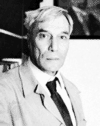Russian poet whose
novel
Doctor
Zhivago helped win him the Nobel Prize for Literature in 1958 but
aroused so much opposition in the Soviet Union that he declined the honour. An
epic of wandering, spiritual isolation, and love amid the harshness of the
Russian Revolution and its aftermath, the novel became an international
best-seller but circulated only in secrecy and translation in his own land.
Pasternak grew up in
a cultured Jewish household. His father, Leonid, was an art professor and a
portraitist of novelist Leo Tolstoy, poet Rainer Maria Rilke, and composer
Sergey Rachmaninoff, all frequent guests at his home, and of Lenin. His mother
was the pianist Rosa Kaufman.
Young Pasternak
himself planned a musical career, though he was a precocious poet. He studied
musical theory and composition for six years, then abruptly switched to
philosophy courses at Moscow University and the University of Marburg (Germany).
Physically disqualified for military service, he worked in a chemical factory in
the Urals during World War I. After the Revolution he worked in the library of
the Soviet commissariat of education.
His first volume of
poetry was published in 1913. In 1917 he brought out a striking second volume, Poverkh
baryerov ("Over the Barriers"), and with the publication of Sestra
moya zhizn (1922; "My Sister Life") he was recognized as a major
new lyrical voice. His poems of that period reflected Symbolist influences.
Though avant-garde and esoteric by Russian standards, they were successful. From
1933 to 1943, however, the gap between his work and the official modes (such as
Socialist Realism) was too wide to permit him to publish, and he feared for his
safety during the purges of the late 1930s. One theory is that Stalin spared him
because Pasternak had translated poets of Stalin's native Georgia. His
translations, which were his main livelihood, included renderings of William
Shakespeare, Johann Wolfgang von Goethe, English Romantic poets, Paul Verlaine,
and Rainer Maria Rilke.
Although Pasternak
hoped for the best when he submitted Doctor Zhivago to a leading Moscow
monthly in 1956, it was rejected with the accusation that "it represented
in a libelous manner the October Revolution, the people who made it, and social
construction in the Soviet Union." The book reached the West in 1957
through an Italian publishing house that had bought rights to it from Pasternak
and refused to return it "for revisions." By 1958, the year of its
English edition, the book had been translated into 18 languages.
In the Soviet Union,
the Nobel Prize brought a campaign of abuse. Pasternak was ejected from the
Union
of Soviet Writers and thus deprived of his livelihood. Public meetings
called for his deportation; he wrote Premier Nikita S. Khrushchev, "Leaving
the motherland will equal death for me." Suffering from cancer and heart
trouble, he spent his last years in his home at Peredelkino.
Pasternak's works in
English translation include short stories, the autobiographical Okhrannaya
gramota (1931; Safe Conduct), and the full range of his poetic
output, which ended on a note of gravity and quiet inwardness.
In 1987 the Union of
Soviet Writers posthumously reinstated Pasternak, a move that gave his works a
legitimacy they had lacked in the Soviet Union since his expulsion from the
writers' union in 1958 and that finally made possible the publication of Doctor
Zhivago in the Soviet Union. In addition to effecting Pasternak's
rehabilitation, the review commission, headed by poet Andrey Voznesensky,
recommended that Pasternak's home in Peredelkino be made a museum. Works of mainly
biographical interest include Olga Ivinskaya, A Captive of Time (1978;
originally published in Russian, 1978); Guy de Mallac, Boris Pasternak: His
Life and Work (1981); Ronald Hingley, Pasternak (1983); Christopher
Barnes, Boris Pasternak: A Literary Biography (1989- ); and Lazar
Fleishman, Boris Pasternak: The Poet and His Politics (1990). Criticism
is represented by Olga R. Hughes, The Poetic World of Boris Pasternak
(1974); Henry Gifford, Pasternak: A Critical Study (1977); and Victor
Erlich (ed.), Pasternak: A Collection of Critical Essays (1978). Munir
Sendich, Boris Pasternak: A Reference Guide (1994), an annotated
bibliography of works by and about Pasternak, 1913-90, includes an essay on the
critical reception Pasternak's writings received. |

